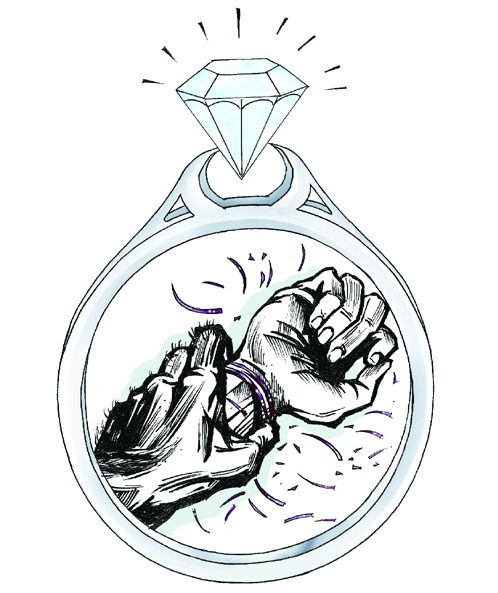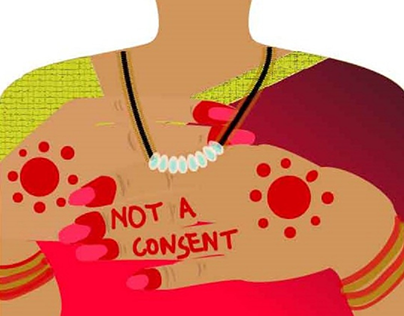Behind Nuptial Doors: Marital Rape in India
- Aftar Ahmed

- Jul 27, 2021
- 6 min read

Image Credits: Reddit
Trigger Warning: The following article contains use of terminology related to sexual violence. Reader’s discretion is advised.
In a plethora of cases over years, the courts have taken a wider perspective of Article 21 (Right To Protection Of Life And Personal Liberty) of the Constitution of India, rather than construing it word for word, and in the process have declared that the right to exercise one’s discretion to enter into or refrain from sexual intercourse is covered under its ambit.
However, in practice, the legislation of India seems to have a completely deviated say in this regard. Exception to section 375 of the Indian Penal Code, 1860, says that ‘a forceful sexual intercourse by a man with his wife, where the wife is above the age of fifteen years, would not amount to rape’. This article aims to deal with this concern by analyzing the ongoing tussle between the judicial interpretation of the Constitution over time and the legislature’s perspective of the same.
Introduction
Section 375 of the Indian Penal Code, 1860 provides that a man has committed rape if he has sexual intercourse with a woman under any of the following six circumstances: (i) against her will, (ii) without her consent, (iii) with her consent, when her consent has been obtained by putting her or any person in whom she is interested in fear of death or of hurt, (iv) with her consent when the man knows that he is not her husband , and that her consent is given because she believes that he is another man to whom she is or believes herself to be lawfully married, (v) with her consent, when, at the time of giving such consent she is of unsound mind, having been intoxicated by him or someone else through administration of any stupefying or unwholesome substance, (vi) with or without consent when she is under sixteen years of age.

Image Credits: dnaindia
To portray a clearer picture, even the slightest penetration into the vagina without the rupturing of the hymen or other private parts of the victim, would amount to rape.
However, the exception clause to section 375 states that sexual intercourse by a man with his wife, the wife not being under fifteen years of age, is not rape. Thus emerged a nexus of the Right To Live With Human Dignity and the offences of rape lurking underneath the umbrella of nuptial relationships.
Marital Rape and Indian Laws:

Image Credits: dailypioneer
No law in India, as with 35 other countries, criminalizes non-consensual, marital sexual intercourse. This is because of several reasons. Firstly, when the IPC was drafted, the law did not consider a married woman as an independent legal entity. Rather, she was perceived as a chattel and property of her husband. As a result, the identity of a married woman was merged with that of her husband under the Doctrine of Coverture. Much of the Indian laws are constructed in a sense to protect and empower women, but traces of the influence of archaic imperial legalities can still be seen in modern India. Secondly, the argument that women would misuse such a law, and that it would ‘subvert the social conception of a family unit’, has been reiterated time and again by the government as an excuse to not criminalize marital rape. However, to quote a Gujarat High Court’s judgement, “Let it be stressed that the safeguards in the criminal justice system are in place to spot and scrutinize false and fabricated marital complaints, and any person who institutes malicious and untrue charges, can be made answerable in accordance with the law.”
Moreover, the government argues that marital rape cannot work in India: it works in the West due to cultural and socio-economic differences. In other words, social customs and religious beliefs combined with staggering illiteracy create an environment wherein marital rape cannot be criminalized. The Achilles heel of this argument is its inability to acknowledge the universal experience of being violated against one’s will. Is a woman garbed in red supposed to renounce all bodily autonomy to the insidious notion of bridehood conceptualized by the Indian government?
The Offence of Cruelty and the Predicament of Subjecting the Said Offence Under it
Section 498(a) was introduced to the Indian Penal Code in 1983 to protect married women from being subjected to cruelty by their husbands and kin by virtue of marriage. It reads: “Whoever being the husband or a relative of the husband of a woman, subjects such a woman to cruelty shall be punished with imprisonment for a term which may extend to three years and shall also be liable to fine.” The term ‘cruelty’ includes non-consensual sexual intercourse. But this provision equates cruelty with rape. Rape is defined under section 375 as non-consensual sexual intercourse by a man with a woman, with a minimum term of seven years in prison. Cruelty, however, is too broad a term to specifically recognize the gravity and heinous nature of the offence of rape. The term of imprisonment for cruelty under section 498(a) is a maximum period of three years. So, is it justifiable to treat an offense as heinous as ‘rape’ pari passu with an offence as vague as ‘cruelty’?
Taking the example of a very recent judgement of Bombay High Court, wherein Justice P. Ganediwala acquitted a man accused of sexual assault of a minor, and held that since there was no skin to skin contact between the accused and the victim per se, the accused would not be liable for sexual assault under the POCSO Act, which prescribes a minimum sentence of three years, rather, he was convicted for the offence under section 354 of the IPC, that is outraging the modesty of a woman which prescribes a minimum imprisonment of one year. However, later, the Supreme Court stayed the verdict of the Bombay High Court, citing it as a disturbing precedent that could encourage sexual offenders to take defense underneath it. The point being, exclusion of a certain offence from the list where it ought to be and placing it among a much milder set of offences is not only precariously problematic, but also encouraging for the offenders, to a perilous extent, as observed by the apex court.
Similarly, the inclusion of marital rape in ‘cruelty’ under section 498(a) instead of ‘rape’ under section 375 encourages husbands to enter into forceful sexual intercourse with their wives. Based on the aforementioned stay and observation by the Supreme Court, such lapses on the grounds of punitive actions likely induce deterrence.
Is Consent Lost on the Grounds of Martial Association?
Many cases show that the Supreme Court recognizes the multifaceted nature of Article 21, which states that ‘no person shall be denied his life and personal liberty except by procedure established by law’. The apex court has only recently started recognizing the right to abstain from sexual intercourse and to be free of reluctant sexual activity enshrined in these broader rights to life and personal liberty. For a few instances, the Supreme Court in State of Karnataka v. Krishnappa held “Sexual violence apart from being a dehumanizing act is an unlawful intrusion of the right to privacy and sanctity of a female.” Another paragraph of the same judgement quotes “non consensual sexual intercourse amounts to physical and sexual violence.”
In the case Suchita Srivastava v. Chandigarh Administration, the right to make choices related to sexual activity was equated with the right to personal liberty, privacy, dignity and bodily integrity under Article 21. And the strongest legal precedent remains with Justice K.S Puttaswami v. Union of India, wherein the Supreme Court explicitly stated that the right to privacy as a fundamental right includes, “decisional privacy reflected by an ability to make intimate decisions primarily consisting of one’s sexual or procreative nature and decisions in respect of intimate relations... forced sexual intercourse and cohabitation is a violation of that fundamental right.”
However, when it comes to the same fundamental right of a married woman, the law appears murky under a blanket of arbitrariness. Despite the courts’ reiteration that right to life encompasses the right to live with human dignity, the monstrous existence of exception to section 375 of the code fails to deter husbands from entering into forced sexual cohabitation with the wife. This, in turn, raises the question, ‘Is the right of a woman to abstain from sexual intercourse lost by her very marital association?’

Image Credits: advocatetanwar
The answer to this seems to be lying in the deliberately obscured depths of the courts’ interpretations of Article 21. Since each precedent considers ‘Women’ as a whole and does not differentiate between married and unmarried women, all women, irrespective of their marital status, possess the fundamental right to exercise their consent and to be able to say ‘No’.
It is, indeed, of grave concern that while the country is celebrating some landmark judgements of section 377 and the ‘Aadhar Card case’ that are creating new yardsticks for the judiciary, the views of the central government of prioritising the stabilisation of ‘institution of marriage’ over a woman’s fundamental right is devastatingly dichotomous.
Laws, as archaic as exception 2 to section 375, do not deserve to occupy a place in the modern and reformed Indian Penal Code. Apart from inflicting monstrous injuries to the rights of a married woman, these notions of the legislature hold India, as a burgeoning superpower, back. So, lawmakers should abrogate obsolete laws that have existed since colonial rule and replace them with the ones that will improve the moral, social and legal conditions of society.
Amitayush Yadav
Amitayush Yadav is a third year student at Dr. Ram Manohar Lohia National Law University, Lucknow, and happens to keep an inclination towards academic writing, not limited to only contentious social issues, but artistic and cultural ones as well.
Email id of the author-






Comments